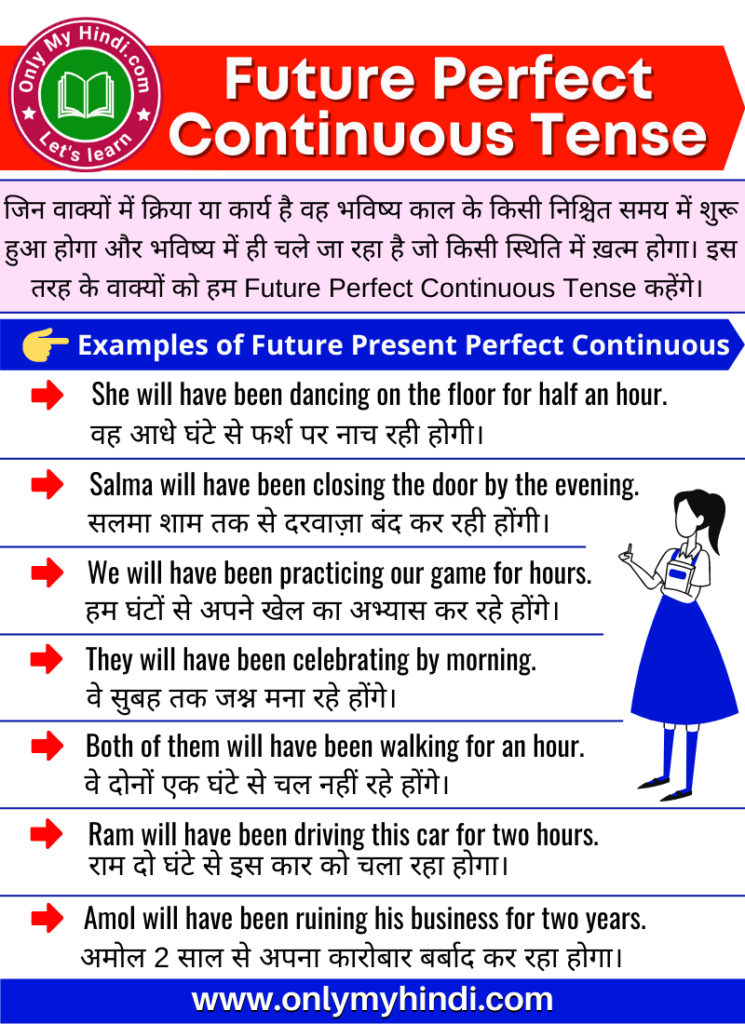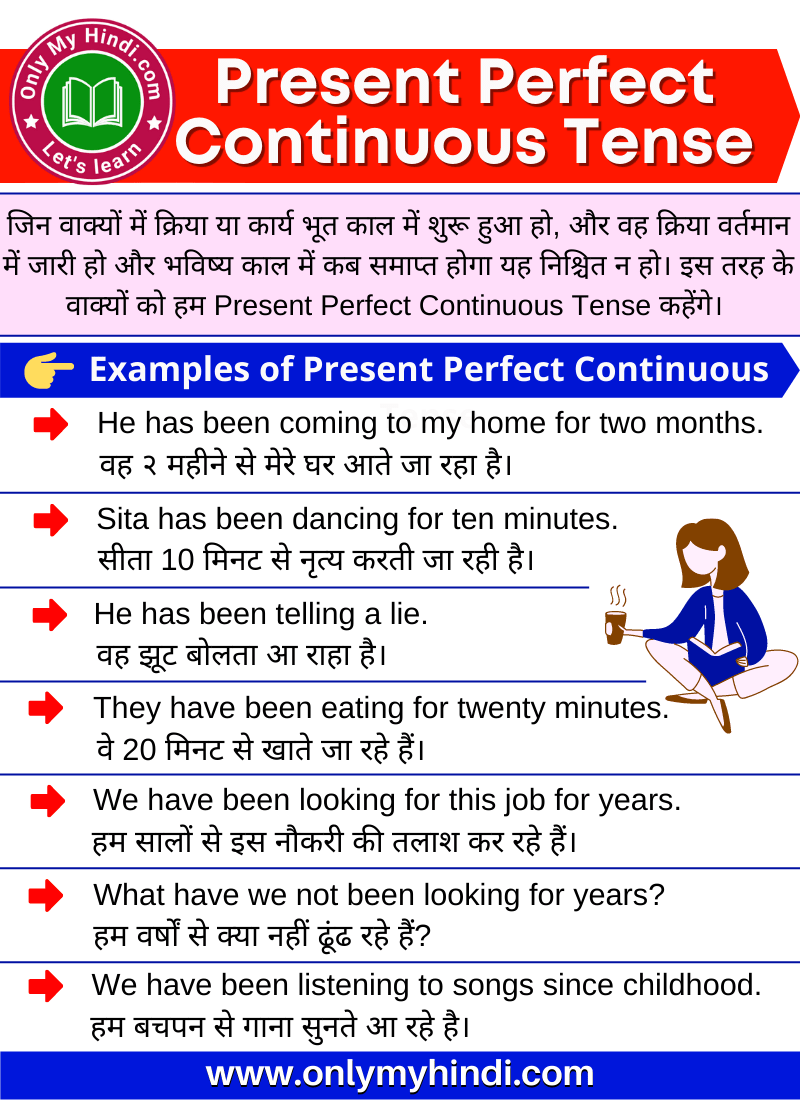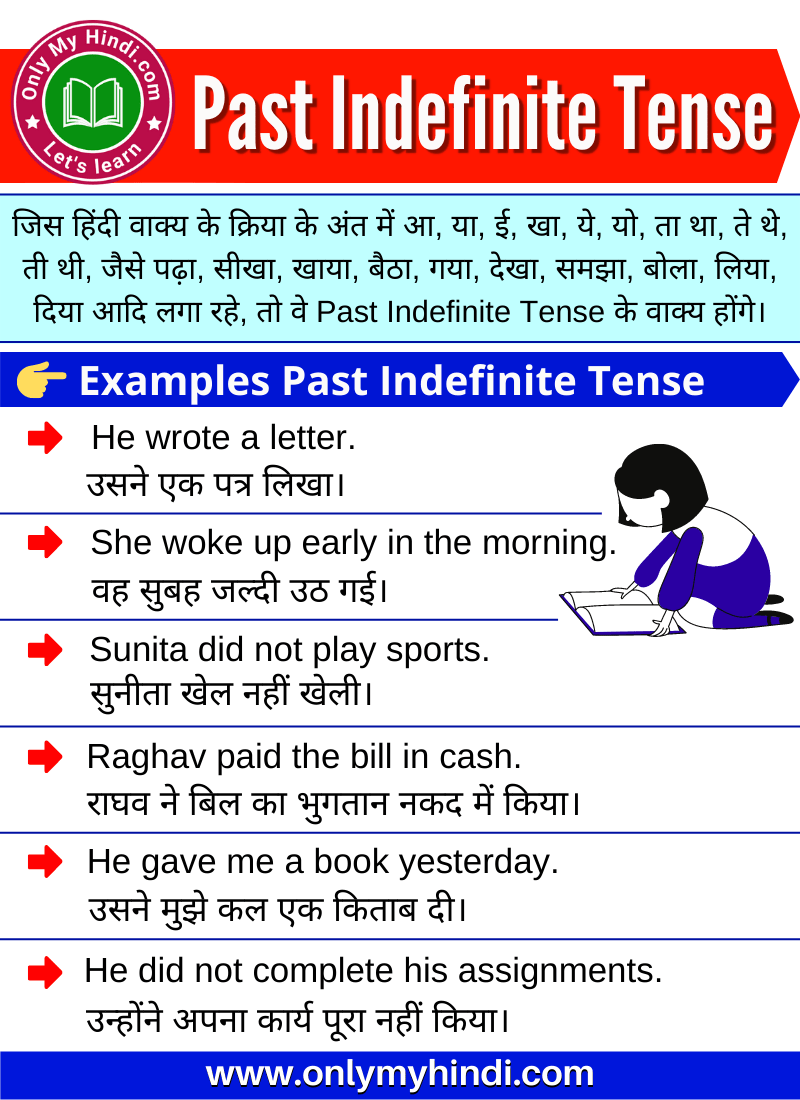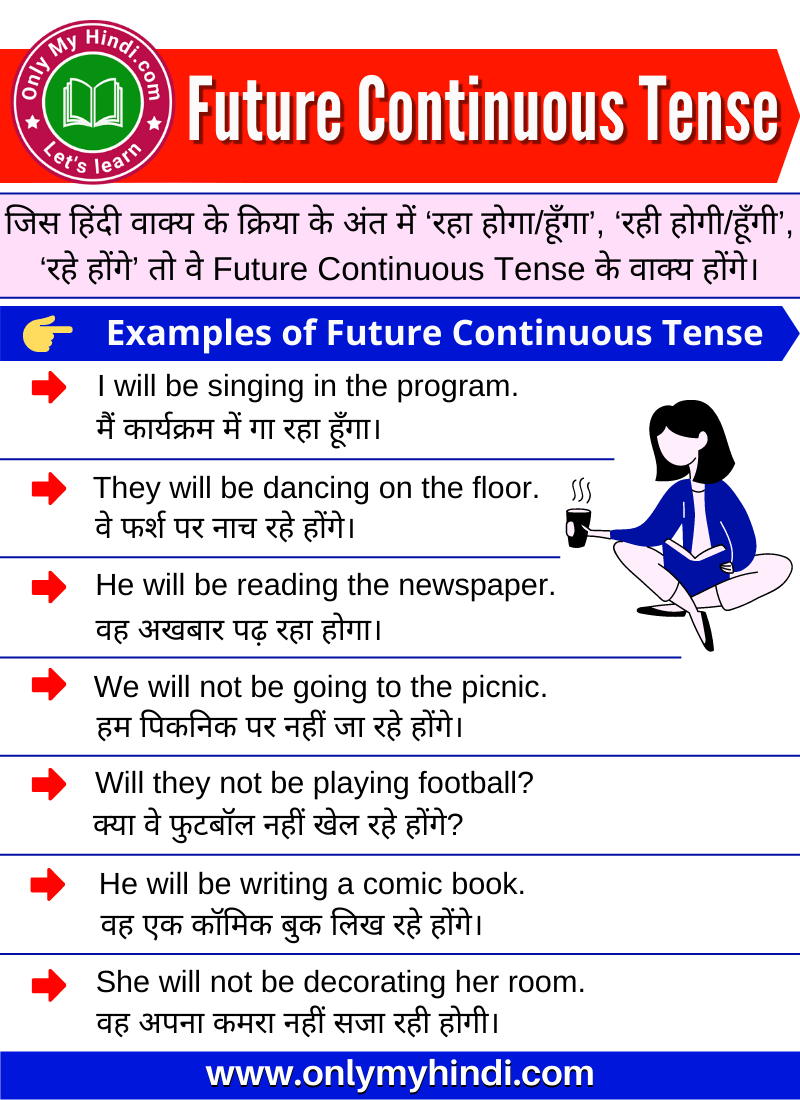क्या आप ढूंढ रहे हैं Future Perfect Continuous Tense in Hindi with Rules, Exercise and Examples? यहां पर हमने आपको सरल भाषा में समझाया है की Future Perfect Continuous क्या होता है, और हम इसे किस तरह से इस्तेमाल कर सकते है।
Future Perfect Continuous Tense in Hindi
‘Future Perfect Continuous Tense’ को हम हिंदी में ‘पूर्ण-अपूर्ण भविष्य काल’ कहते हैं या फिर ‘भविष्य पूर्ण-निरंतर काल’ भी कहते हैं।
‘Future Perfect Continuous Tense’ वाक्यों में हम देखते है के जो कार्य है वह भविष्य काल के किसी निश्चित समय में शुरू हुआ होगा और भविष्य में ही चले जा रहा है जो किसी स्थिति में ख़त्म होगा।
Future Perfect Continuous Tense की पहचान
Future Perfect Continuous Tense ‘पूर्ण-अपूर्ण भविष्य काल’ को हम किस तरह पहचान सकते हैं? इस Tense के वाक्यों के अंत में ‘रहा होगा’, ‘रही होगी’, ‘रहे होंगे’, ‘रहा हूँगा’, ‘रही हूँगी’ आदि शब्द आते है।
Future Perfect Continuous Tense के वाक्यों में हमें समय दिया गया होता है जिसमें हो रहे कार्य अपूर्ण होते है। Future Perfect Continuous Tense के अंग्रेजी वाक्यों में helping verb ‘will + have + been’ का उपयोग होता है और इसके साथ में Verb (ing form) उपयोग होता है जो कार्य के भविष्यकाल के किसी समय में शुरू होने की बात दर्शाता है
Formula: Subject + will + have + been + verb (ing) + object + time reference.

Future Perfect Continuous Tense Examples in Hindi
- He will have been reading the newspaper since ten o’clock.
वह 10 बजे से अखबार पढ़ रहा होगा।
- She will have been dancing on the floor for half an hour.
वह आधे घंटे से फर्श पर नाच रही होगी।
- The players will have been playing cricket for two hours.
खिलाड़ी दो घंटे से क्रिकेट खेल रहे होंगे।
- They will have been watching movies by tomorrow morning.
वे कल सुबह तक मूवी देख रहे होंगे।
- Salma will have been closing the door by the evening.
सलमा शाम तक से दरवाज़ा बंद कर रही होंगी।
Types of Future Perfect Continuous Tense in Hindi
Future Perfect Continuous Tense के वाक्यों के कुल तीन प्रकार होते हैं।
- Affirmative sentence (सकारात्मक वाक्य)
- Negative sentence (नकारात्मक वाक्य)
- Interrogative sentence (प्रश्नवाचक वाक्य)
Affirmative Sentence
‘Affirmative sentence’ of Future Perfect Continuous tense पूर्ण-अपूर्ण भविष्यकाल के सामान्य सकारात्मक वाक्य है जो किसी वाक्य में हो रहे या हो चुके कार्य के सकारात्मकता को दर्शाते हैं।
Affirmative sentence की रचना:
Formula: Subject + will + have + been + verb (ing) + object + time reference.
Examples,
- We will have been practicing our game for hours.
हम घंटों से अपने खेल का अभ्यास कर रहे होंगे।
- Both of them will have been walking for an hour.
वे दोनों एक घंटे से चल रहे होंगे।
- Society will have been talking about it for a few months.
समाज इसके बारे में कुछ महीनों से बात कर रहा होगा।
- They will have been celebrating by morning.
वे सुबह तक जश्न मना रहे होंगे।
- She will have been writing a letter to my uncle for some time.
वह शाम तक मेरे अंकल को पत्र लिख रही होगी।
Negative Sentence
‘Negative sentence’ of Future Perfect Continuous tense पूर्ण-अपूर्ण भविष्यकाल के सामान्य नकारात्मक वाक्य है जो किसी वाक्यों के व्यक्त किये गए कार्यों को नकारात्मक तरीके से दर्शाते हैं।
इन वाक्यों में जो helping verb है उनके साथ not का इस्तेमाल होता है जो नकारात्मकता को दर्शाता हैं।
Negative sentence की रचना
Formula: Subject + will + not + have + been + verb (ing) + object + time reference.
Examples,
- We will have been practicing our game for hours.
हम घंटों से अभ्यास नहीं कर रहे होंगे।
- Both of them will have been walking for an hour.
वे दोनों एक घंटे से चल नहीं रहे होंगे।
- Society will have been talking about it for a few months.
समाज इसके बारे में कुछ महीनों से बात नहीं कर रहा होगा।
- They will have been celebrating by morning.
वे सुबह तक उत्सव नहीं मना रहे होंगे।
- She will have been writing a letter to my uncle for some time.
वह कुछ समय से मेरे चाचा को पत्र नहीं लिख रही होगी।
Interrogative Sentence
‘Interrogative sentence’ of Future Perfect Continuous tense पूर्ण-अपूर्ण भविष्यकाल के सामान्य प्रश्नात्मक वाक्य है जो किसी वाक्यों के व्यक्त किये गए कार्यों को प्रश्नात्मक तरीके से व्यक्त करते हैं।
प्रश्नात्मक वाक्य helping verbs से शुरू होता है और अंत में Question mark से ख़त्म होता है जो प्रश्नात्मकता को दर्शाता है।
Interrogative sentence की रचना:
Formula:
Will + subject + have + been + verb (ing) + object + time reference + ?
Will + subject + not + have + been + verb (ing) + object + time reference + ?
Wh word + will + subject + have + been + verb (ing) + object + time reference + ?
Wh word + will + subject + not + have + been + verb (ing) + object + time reference + ?
Examples,
- Where will we have been practicing our game for hours?
हम घंटों से अपने खेल का अभ्यास कहाँ कर रहे होंगे?
- Will both have been walking for an hour?
क्या दोनों एक घंटे से टहलते आ रहे होंगे?
- What will society have been talking about for a few months now?
कुछ महीनों से समाज किस बारे में बात कर रहा होगा?
- Will they have been celebrating till morning?
क्या वे सुबह तक सेलिब्रेट कर रहे होंगे?
- Will she have been writing a letter to my uncle for some time?
क्या वह कुछ समय से मेरे अंकल को पत्र लिख रही होगी ?
Future Perfect Continuous Tense Sentences in Hindi
For Affirmative sentences,
- I will have been doing my work for half an hour more.
मैं अपना काम आधे घंटे से अधिक समय से करता आ रहा हूँगा।
- Suraj will have been going to classes for five years.
सूरज 5 साल से क्लास में जा रहा होगा।
- He will have been calling you by next week.
वह आपको अगले हफ्ते तक बुला रहे होंगे।
- Rohan will have been enjoying the tour by this sunday.
रोहन इस रविवार तक टूर का मजा ले रहा होगा।
- I will have been eating my breakfast since tuesday.
मैं मंगलवार से अपना नाश्ता कर रही हूँगी।
- Students will have been going to the school for twenty days.
विद्यार्थी 20 दिनों से स्कूल जा रहे होंगे।
- Ram will have been driving this car for two hours.
राम दो घंटे से इस कार को चला रहा होगा।
- She will have been throwing a ball to her opponent quickly.
वह अपने प्रतिद्वंद्वी को तेजी से गेंद फेंक रही होगी।
- Chandan will have been working on the computer for more than three hours.
चंदन कंप्यूटर पर 3 घंटे से अधिक समय से काम कर रहा होगा।
- Amol will have been ruining his business for two years.
अमोल 2 साल से अपना कारोबार बर्बाद कर रहा होगा।
For Negative sentences,
- I will not have been doing my work for half an hour.
मैं आधे घंटे से अपना काम नहीं कर रहा हूँगा।
- Suraj will not have been going to classes for three years.
सूरज 5 वर्ष से कक्षा में नहीं जा रहा होगा।
- He will not have been calling you until next week.
वह आपको अगले हफ्ते तक फोन नहीं कर रहा होगा।
- Rohan will not have been enjoying the tour by this Sunday.
रोहन इस रविवार तक टूर का आनंद नहीं ले रहा होगा।
- I will not have been eating my breakfast since Tuesday.
मैं मंगलवार से अपना नाश्ता नहीं कर रही हूँगी।
- The students will not have been going to school for twenty days.
विद्यार्थी 20 दिन से स्कूल नहीं जा रहे होंगे।
- Ram will not have been driving this car for two hours.
राम इस कार को दो घंटे से नहीं चला रहा होगा।
- She will not have been throwing a ball to her opponent quickly.
वह अपने प्रतिद्वंद्वी को जल्दी से गेंद नहीं फेंक रही होगी।
- Chandan will not have been working on the computer for more than 3 hours.
चंदन 3 घंटे से अधिक समय से कंप्यूटर पर काम नहीं कर रहा होगा।
- Amol will not have been ruining his business for two years.
अमोल 2 साल से अपना बिजनेस बर्बाद नहीं कर रहा होगा।
For Interrogative sentences,
- (Interrogative Affirmative sentences)
- Will I have been doing my work for half an hour?
क्या मैं आधे घंटे से अपना काम कर रहा हूँगा?
- Will Suraj have been going to the classes for five years?
क्या सूरज 5 साल से क्लास में जा रहा होगा?
- How will we have been calling you by next week?
हम आपको अगले सप्ताह तक कैसे कॉल कर रहे होंगे?
- Will Rohan have been enjoying the tour from next Sunday?
क्या रोहन अगले रविवार से टूर का आनंद ले रहा होगा?
- Why will I have been eating my breakfast since Tuesday?
मैं मंगलवार से अपना नाश्ता क्यों खा रहा हूँगा?
- Will the students have been going to the school for twenty days?
क्या विद्यार्थी 20 दिन से विद्यालय जा रहे होंगे?
- How will Ram have been driving this car for two hours?
राम दो घंटे से इस कार को कैसे चला रहा होगा?
- Why will she have been throwing a ball to her opponent so quickly?
वह अपने प्रतिद्वंद्वी को इतनी जल्दी गेंद क्यों फेंक रही होगी?
- Will Chandan have been working on the computer for more than three hours?
क्या चंदन 3 घंटे से अधिक समय से कंप्यूटर पर कार्य कर रहा होगा?
- Why will Amol have been ruining his business for two years?
अमोल 2 साल से अपना व्यापार क्यों बर्बाद कर रहा होगा?
- (Interrogative Negative sentences)
- Will I not have been doing my work for half an hour?
क्या मैं अपना काम आधे घंटे से नहीं कर रहा होगा ?
- Will Suraj not have been going to the classes for five years?
क्या सूरज 5 साल से कक्षा में नहीं जा रहा होगा ?
- How will not we have been calling you by next week?
हम आपको अगले हफ्ते तक कैसे नहीं बुला रहे होंगे?
- Will Rohan not have been enjoying the tour from next Sunday?
क्या रोहन अगले रविवार से दौरे का आनंद नहीं ले रहा होगा?
- Why will I not have been eating my breakfast since Tuesday?
मैं मंगलवार से अपना नाश्ता क्यों नहीं खा रहा होगा?
- Will the students not have been going to the school for twenty days?
क्या विद्यार्थी 20 दिन से विद्यालय नहीं जा रहे होंगे?
- How will Ram not have been driving this car for two hours?
राम दो घंटे से इस कार को कैसे नहीं चला रहा होगा?
- Why will she not have been throwing a ball to her opponent so quickly?
वह अपने प्रतिद्वंद्वी को इतनी जल्दी गेंद क्यों नहीं फेंक रही होगी?
- Will Chandan not have been working on the computer for more than three hours?
क्या चंदन 3 घंटे से ज्यादा समय से कंप्यूटर पर काम नहीं कर रहा होगा?
- Why will Amol not have been ruining his business for two years?
अमोल 2 साल से अपना बिजनेस क्यों बर्बाद नहीं कर रहा होगा?
Future Perfect Continuous Tense Exercises in Hindi
- It _______________ in Shimla last week. (snow)
- My brother ______________ Goa for three days. (visit)
- She ________________ to my home since Tuesday. (not come)
- _____ we _____________ to Pune to enjoy this week? (go)
- Sameer ________________ that blue car for two years. (not follow)
- She ______________ to her friend for three years. (talk)
- Where _____ he _____________ to picnic for thirty years? (go)
- He _____________ hockey for two months. (not play)
- Neha ________________ for a job for years. (not look)
- _____ she _______________ for something for a few years? (search)
Answers:
- It will have been snowing in Shimla last week. (visit)
- My brother will have been visiting Goa for three days. (not come)
- She will not have been coming to my home since Tuesday. (go)
- Will we have been going to Pune to enjoy this week? (not follow)
- Sameer will not have been following that blue car for two years. (talk)
- She will have been talking to her friend for three years. (talk)
- Where will he have been going to picnic for thirty years? (go)
- He will not have been playing hockey for two months. (not play)
- Neha will not have been looking for a job for years. (not look)
- Will she have been searching for something for a few years? (search)
More Tenses


